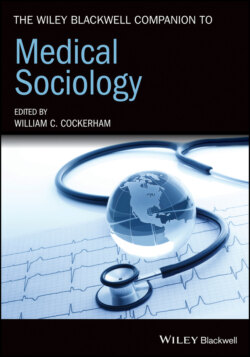Читать книгу The Wiley Blackwell Companion to Medical Sociology - Группа авторов - Страница 43
INTRODUCTION
ОглавлениеAfter accepting the task of writing a chapter on research methods in medical sociology, we were excited and then immediately overwhelmed at the breadth of the topic. Medical sociology is a diverse field in terms of methodological approaches. In the sections of this chapter that follow, we’ve tried our best to meaningfully condense this large literature into an introduction to key methodological issues and research in medical sociology (but many of the issues we review are relevant to all social science research). In an effort to speak to a broad audience within medical sociology, we rarely discuss more than the most basic technical details of specific methods. Instead, we highlight the underlying logic of research methods in medical sociology and the types of answers to research questions different methods can provide. To that end, before we outline the specific topics in this chapter, we need to mention a few basic requirements of sociological research.
The first requirement is a researchable question (Firebaugh 2008; Lieberson 1985). People often bring up broad existential questions to spark conversation – What’s the true nature of humankind? Is world peace possible? These are examples of questions that we don’t consider researchable, though they can inspire researchable questions. A researchable question in medical sociology is one that can be answered with empirical evidence collected and analyzed using acceptable research methods among contemporary medical sociologists. Researchable questions are also asked in such a way that their answer is capable of overturning one’s assumptions about the social world. For example, is educational attainment associated with health in the US population? This is a question that is answerable with available data and research methods in medical sociology. Its answer also speaks to an underlying theory about education and health in the US, which brings us to our next requirement – a theoretical model.
The second requirement is a theoretical model informed by sociology. In very simple terms, theoretical models are abstract representations of social phenomena, and research methods are how sociologists investigate the empirical implications of theoretical models (Lieberson and Horwich 2008). Theory is thus critical to deciding which methodological approach, among many potentially appropriate approaches, is best suited for your research question. No single theoretical perspective dominates medical sociology, but a baseline – if often tacit – assumption is that the distribution of illness and disease in a population is determined by how exactly that population is socially organized. Continuing with our education-health example from above, we only arrived at our question because of an extensive body of research that finds an association between education and health. One explanation of the education-health association suggests that sweeping macroeconomic changes in the twentieth and twenty-first centuries transformed education into a social determinant of illness and disease in the US (Link and Phelan 1995; Masters et al. 2015; Phelan and Link 2015; Wolfe et al. 2018a; 2018b; Wolfe 2019). To extend this line of inquiry, we might elaborate on our initial question and ask whether the association between education and health changed for people who lived before and after the rapid expansion of higher education in the US. Although this is just a slight alteration to our original question, it has major implications for our research methods. Our point is that researchers should always strive to inform a broader theoretical model of health and society, and their choice of research methods should reflect and explicitly acknowledge that model.
The third requirement is reproducibility and transparency (Freese 2007; Long 2009). Reproducibility means that the investigators maintain all of the data and analysis files necessary to reproduce the results they publicly report, and transparency includes reporting pertinent information and decisions alongside the results. These are necessary for ensuring scientific accumulation and enhancing the credibility of findings. We should note that a study can be reproducible without being replicable. A study is replicable when multiple studies using different data (more on data coming up) come to the same overall conclusions. Reproducibility simply means that the researchers have preserved the instructions for recreating their study’s results so that other researchers can extend or correct findings. Maintaining a study’s reproducibility can be a time consuming and thankless job, but it’s a necessary part of conducting good research and contributing to the scientific community.
Our examples thus far are quantitative, but these three requirements apply equally to qualitative work and even descriptive research exploring new areas without explicit guidance from sociological theory. Related, although we organize key topics in quantitative and qualitative research separately, we believe in a fluidity of research designs, taking a dynamic and flexible approach to our empirical investigating of the social world. Science is a cumulative effort, and different research methods shed light on sociological problems from different angles (Collins 1989; Gross 2009; Lieberson and Horwich 2008).
With our basic requirements out of the way, we can now provide a short outline of the sections to come. We begin our discussion by reviewing data and related issues such as the importance of conceptualization and choosing the appropriate level of analysis. We then discuss methods for analyzing data, beginning with quantitative issues like measurement and causality. Next we consider several qualitative methods, including special topics that offer interesting new avenues for research in medical sociology.
